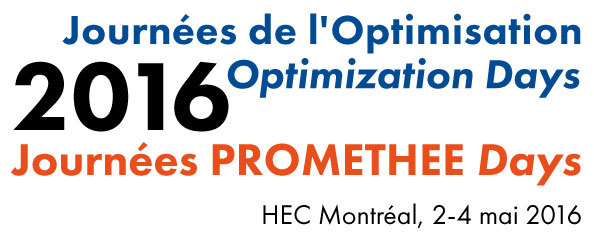
Journées de l'optimisation 2016
HEC Montréal, Québec, Canada, 2 — 4 mai 2016

TA11 Multicriteria Optimization
3 mai 2016 10h30 – 12h10
Salle: Cogeco
Présidée par Tolga Bektas
3 présentations
-
 10h30 - 10h55
10h30 - 10h55Multi-objective mapping of full-mission simulators on heterogeneous distributed multi-processor systems
Full-Mission Simulators, which accurately simulates fighter aircrafts, are considered as the most critical simulation tools belonging to the flight simulators family. Due to its tight timing constraints and its high computational cost, they need to run in high-performance computing systems. In this paper, we propose a general framework based on an improved version of the non-dominated sorting genetic algorithm-II. The aim is to efficiently map the real-time tasks making up the simulator on the processing units of the target architecture and schedule their execution with respect to the hard timing constraints, since missing a deadline can lead to catastrophic failure.
-
 10h55 - 11h20
10h55 - 11h20Using DEA and AHP for hierarchical structures of data
The author [Pakkar, M. S. (2015). An integrated approach based on DEA and AHP. Computational Management Science, 12 (1), 153-169] recently proposed an integrated Data Envelopment Analysis (DEA) and Analytic Hierarchy Process (AHP) approach to assess the performance of Decision Making Units (DMUs) under hierarchical structures of data. Nonetheless, this approach is limited to the situations with a two-level hierarchy, which might not entirely satisfy the needs of more complex problems. The current paper extends this approach to the situations with a three-level hierarchy which reflects the characteristics of a generalized multi-level hierarchy. An illustrative example of road safety performance for a set of 19 European countries highlights the usefulness of the proposed “extended approach”.
-
 11h20 - 11h45
11h20 - 11h45Disjunctive programming for multiobjective discrete optimization
In this talk, I will show how multiobjective discrete optimization problem (MDOP) can be cast as a disjunctive program such that each disjunction is either an empty set, or contains an efficient solution. I will then describe an iterative algorithm, wherein each iteration solves an integer subproblem, one for each disjunction, to search for an efficient solution. The algorithm generates the entire nondominated set of points to a given MDOP. I will present computational results on various multiobjective problem instances.
